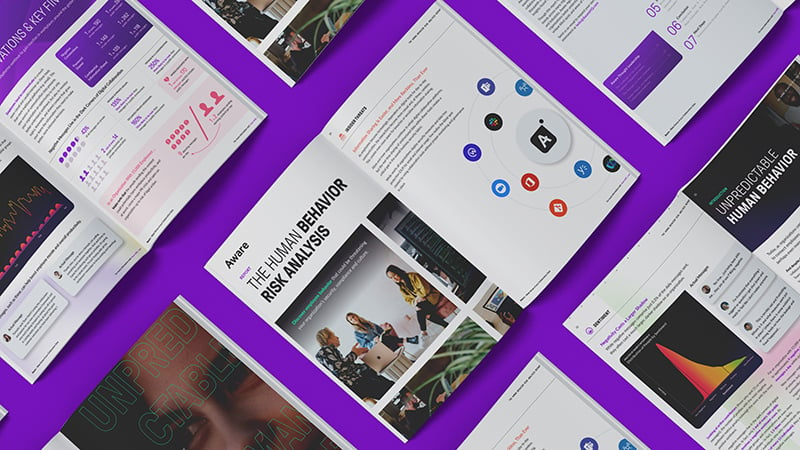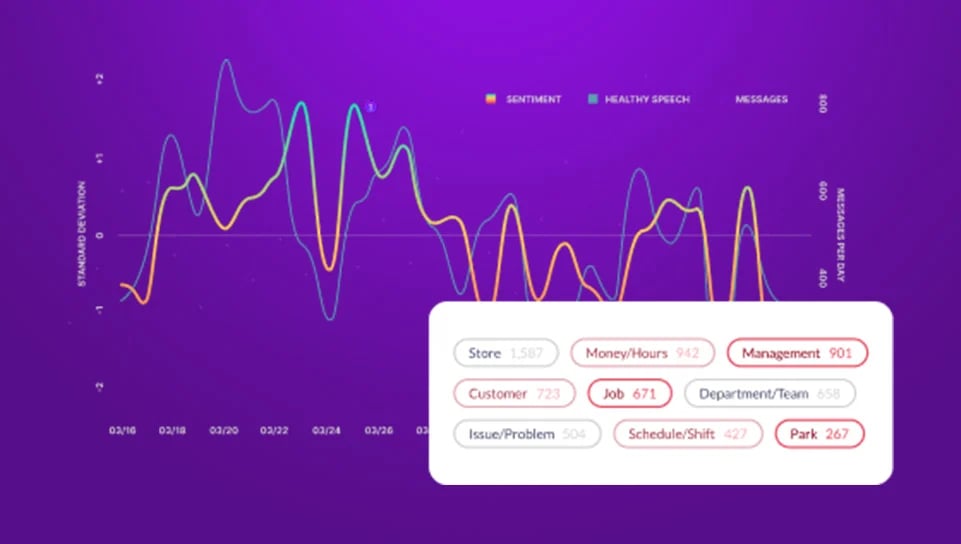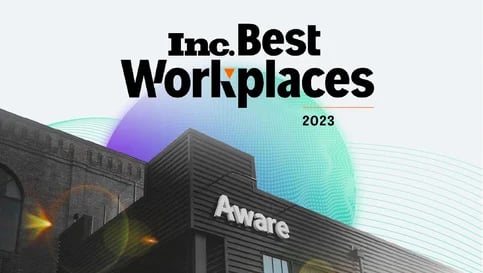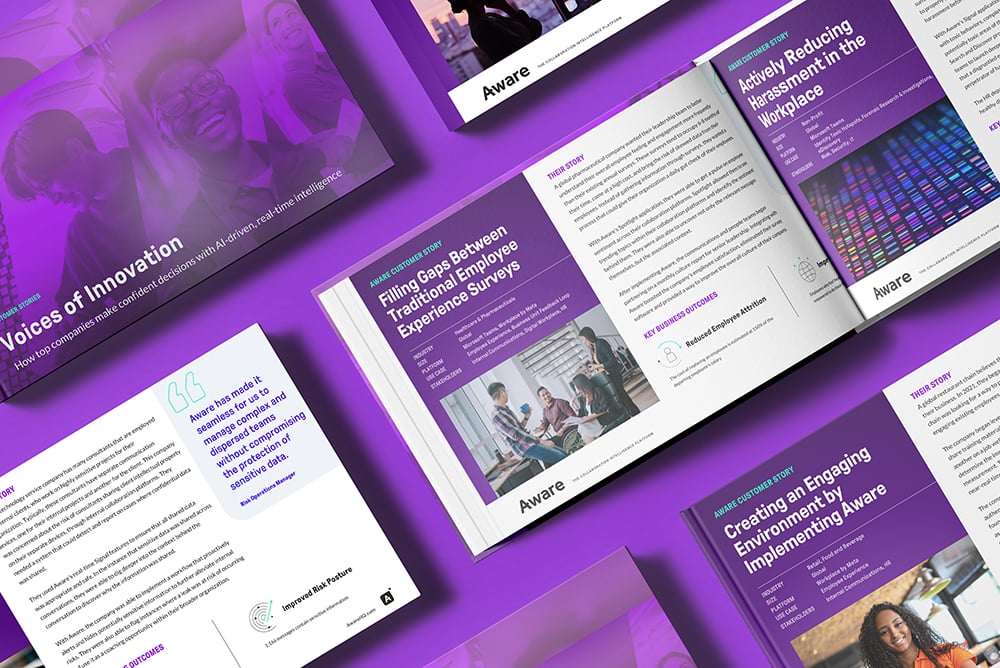PURPOSE-BUILT FOR LEGAL TEAMS
Handle legal tasks with ease and accuracy
Less manual work. Lower costs. Greater accuracy. Facilitate a simplified eDiscovery and compliance workflow for data from platforms like Slack, Microsoft Teams, Workplace by Meta and Zoom.
Preservation
Collections
Review
“Aware has innovative capabilities no other vendors have. There is no learning curve, and it surfaces the data we need, fast!”
— Legal Operations

POWERING PRODUCTIVITY FROM STARTUP TO FORTUNE 100
compare and save
Less manual work. Greater accuracy.
Aware’s purpose-built preservation, collections and review capabilities deliver contextualized results that uncover the who, what, where, when, and why.
Native exports
.png?width=386&height=500&name=Code%20snippet%20(1).png)
-
Manual data analysis
-
Higher operational expenses
-
Inaccurate results
Aware
-
Quicker time to context
-
Reduced legal costs
-
Fewer false positives
WHY AWARE
A simplified, defensible legal workflow
Work seamlessly with IT and compliance teams. Optimize for speed without sacrificing accuracy. eDiscovery and compliance activities are made easier by surfacing and managing data from multiple collaboration platforms in one unified solution.
HOW AWARE FOR LEGAL TEAMS WORKS
Smarter data collection
Ingest your data across collaboration platforms in real-time or leverage ad-hoc user-based historical scans for Slack.
Easily search & filter results with AI
Search by custodian, keyword, channel, and more, then filter results with sentiment, toxicity, image OCR, and code detection powered by Aware's platform, and uncover results complete with reactions, edits and deletes.
Quick data production & spoliation prevention
One-click legal holds retain relevant data—including related conversation context—within an immutable and defensible archive.
Ease compliance burdens
Enable faster record requests, DSARs and more with user data removal and granular retention policies that make internal, external and regulatory compliance a snap.
Plug into your existing tools
Export results in a variety of load-ready formats like RSMF and enhanced PDF, or connect to your existing solutions for more effective compliance management or early-case assessment.
.png?width=775&height=627&name=Content-img%20(1).png)
AI-powered culling
Contextual results
Preserve modification history
Native data management
Flexible exports
Automated audit trails
INFORMATION GOVERNANCE
A single platform to meet the needs of stakeholders across the company
Data Migration
Connect your existing toolsets and turn legacy data into a valuable resource.
Data Archiving
Streamline storage, enhance data accessibility, and ensure regulatory compliance.
Data Monitoring
Gain real-time insights, early threat detection, and proactive risk mitigation.
INTEGRATIONS
Streamline your workflow
With the click of a button, Aware leverages native APIs and webhooks to ingest and analyze data from across collaboration channels.
Extend the value of the platform by integrating Aware's insights into your existing global hold and legal solutions with RSMF-ready exports and workflow APIs.
AWARE PRODUCTS
Looking for more?
Streamline data protection, compliance, and collaboration tools with Aware's integrated solution. Cut through the red tape and confidently administer successful collaboration at scale.
Compliance
- Information Governance
- Data Retention
- Compliance Monitoring
- Audits & Investigations
Security
- Data Management & Remediation
- Forensics & Investigations
- Sensitive Data Monitoring & DLP
- Incident Response
Latest blog posts
The latest news, technologies, and resources from our team.
Questions? We're here to help
Everything you need to know about the Aware platform.
What are collaboration tools?
Any tool that enables employees to work together is a kind of collaboration tool. This included dedicated collaboration tools like Slack and Microsoft Teams, enterprise social media platforms like Microsoft Viva Engage (formerly Yammer) and Workplace from Meta, and frontline management tools such as WorkJam. Many other tools also have collaboration features built in, such as Zoom (via Zoom Team Chat) and Google Drive.
What is forensic research and investigation?
Forensic search is a process that involves the use of forensic techniques to search conversations and collect electronic data that may be used as evidence in internal or external investigations. The process of conducting forensic research and investigations begins with identifying the electronic data that may be relevant, usually based on custodian, data, location, and data type. Within collaboration datasets, this data has historically proven difficult to access, but Aware’s automated search functionality brings forensic research to conversations in Slack, Teams, Zoom, and more.
What is federated search?
Organizations use federated search to investigate multiple databases or sources simultaneously and present the results from a single pane of glass. Federated search is particularly useful when searching lots of data or information stored in multiple databases. As over 90% of organizations use at least two collaboration tools (Slack, Teams, Zoom, etc.), federated search from Aware enables investigations into all locations simultaneously.
What are the challenges of performing eDiscovery in collaboration data?
Collaboration tools enable a range of features that make eDiscovery more complicated to perform. For example, collaboration messages can occur in public and private groups or direct messages. This hinders an investigator’s ability to search chat history because a user may have posted in locations that are not readily visible. To search collaboration messages effectively usually requires the use of a third-party tool. However, if that tool does not capture in real time a complete record of all revisions and deletions, spoilation is easy because custodians can always edit or remove their messages.
How can companies perform early case assessment using collaboration data?
Early case assessment (ECA) is an eDiscovery process that helps legal teams make informed decisions about how to approach a case by identifying key information to understand the scope and merits of a case and estimate potential costs. ECA can also help legal teams identify potential risks and opportunities, such as data privacy or regulatory compliance issues, and develop strategies to mitigate those risks. To approach early case assessment efficiently, investigators must be able to search collaboration messages and surface all relevant content and context. This requires permissions to search all messages, including private and direct messages. Full administrator privileges and/or a third-party eDiscovery platform that plugs into the collaboration tools are typically required to enable early case assessment in collaboration.
What kinds of eDiscovery investigations does Aware support in collaboration?
Aware enables investigators to conduct any kind of eDiscovery investigation with federated search for collaboration messages from a centralized archive that contains a complete record of revisions and deletions, captured in real time.
What file types and eDiscovery tools does Aware export to?
Aware exports eDiscovery and early case assessment results to .pdf, .dat, .csv and RSMF formats along with .txt files of every message and text base file. These exports are compatible with all major eDiscovery software, enabling legal teams to analyze collaboration search results according to their usual workflows.
What does the Aware eDiscovery process look like?
Aware ingests collaboration messages from all major tools across the enterprise environment, then normalizes and infuses the data with AI/ML metadata insights designed for the nuances of collaboration. This ensures no loss of context and a complete, defensible record of all messages, including revisions and deletions. From the Aware platform, investigators can conduct federated search of collaboration messages within all tools simultaneously. Searches may be initiated by a range of variables, including custodian, location, message type, date and time, and other factors. Results can then be narrowed by enhanced insights such as sentiment or toxicity. This reduces the time to discovery by producing the most relevant results, delivered with complete context for better understand of who, what, where, when, how, and why.
How does Aware enable faster eDiscovery in collaboration?
Performing eDiscovery in collaboration presents several challenges. Varying permissions regarding message visibility make it harder to surface a complete record of all chat messages. Custodians retain control of their messages after sending, meaning they can edit or delete what they wrote, even months afterward. This increases the likelihood of spoilation. And legacy eDiscovery tools cannot process non-standard message features such as emojis and gifs, leading to missing context. Aware solves for all these problems by ingesting collaboration messages in real time into a centralized archive built for the nuances of collaboration data. This reduces time to discovery and empowers faster eDiscovery search by producing only the most relevant results, without loss of context.
What other use cases does Aware support in addition to eDiscovery in collaboration?
The Aware data platform uses industry-leading natural language processing (NLP) capabilities to analyze collaboration conversations and infuse them with AI-powered metadata that provides the context business leaders need to protect their organizations and support the employee experience. Using Aware’s proprietary technology, organizations can retain control of information governance, retention, compliance adherence, insider threat hunting, and more across the entire collaboration ecosystem from a single, centralized platform.
